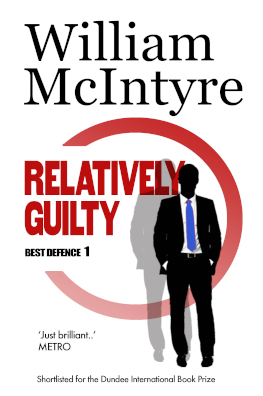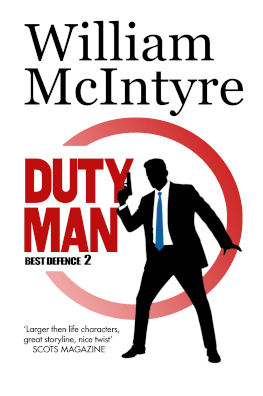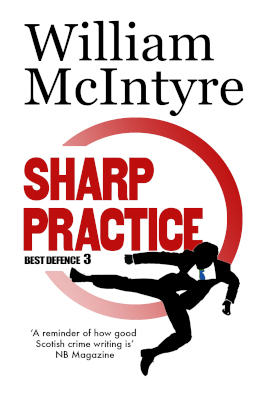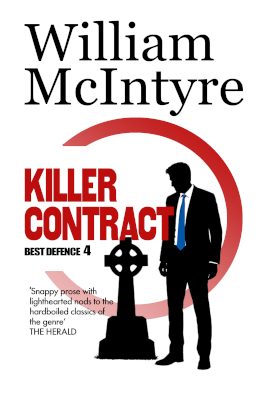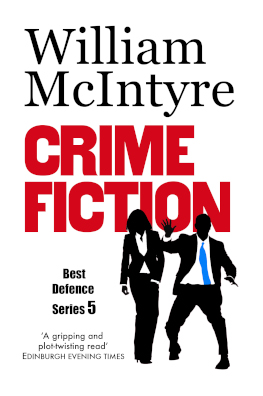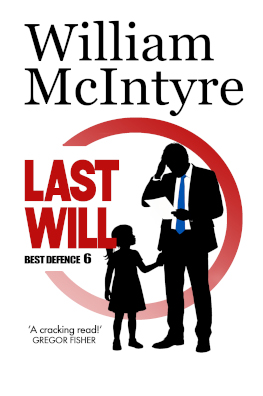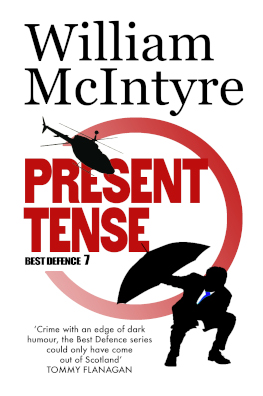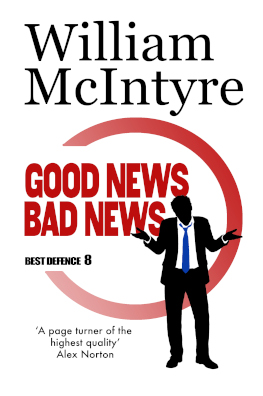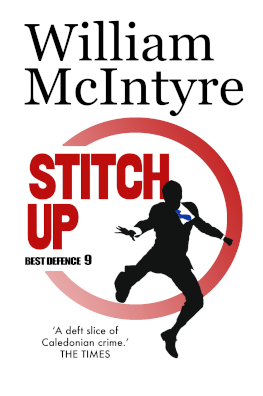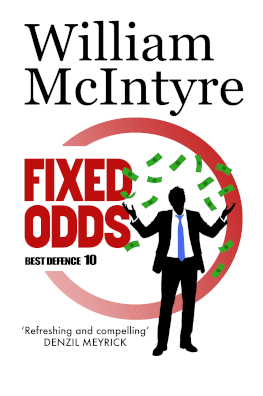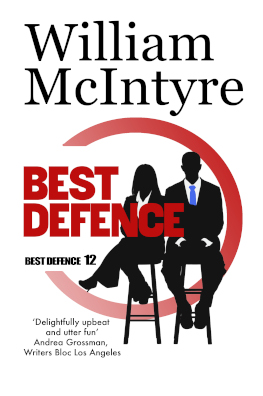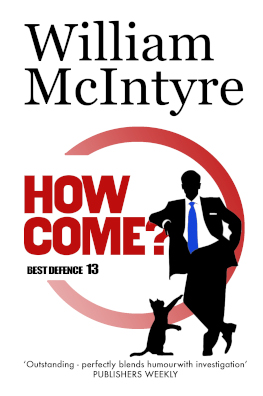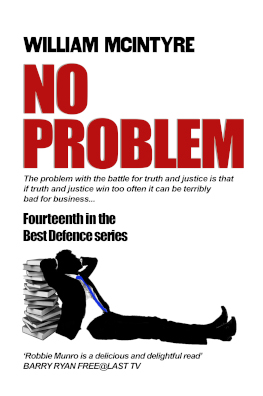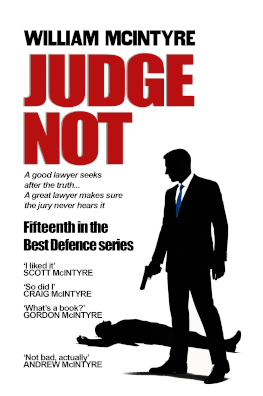The Best Defence Series
Follow the trials of Scots criminal lawyer Robbie Munro as he joins battle in the fight for truth and justice - hoping truth and justice don't win too often because it's terribly bad for business.
Free@Last TV, the producers of Agatha Raisin, have acquired the TV rights to the Best Defence Series.
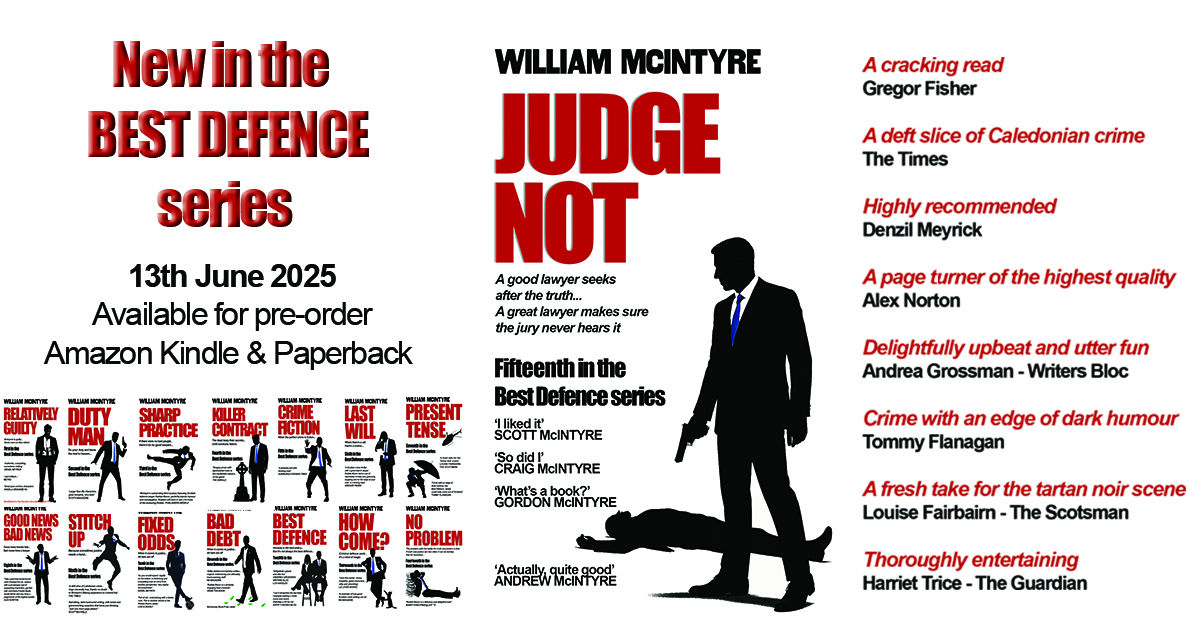
Judge Not
#15 in the Best Defence Series, featuring criminal lawyer Robbie Munro
Did the Rev Eddie Dunlop avenge his wife's murder?
Of course he did.
Is he linked to a series of gang killings?
It certainly looks like it.
Why is Robbie Munro defending a man who won’t stop admitting his guilt?
The question is: does he have any other option?
The Books
William McIntyre

True(ish) tales from the frontline
I'm a Scots lawyer. In fact, I have been a criminal defence lawyer for so long, I can just about remember the last time the legal aid rates were increased and the days when I could lift a copy of the Criminal Procedure Act off the desk without putting my back out.
I have tried to make the Best Defence Series as realistic as possible, borrowing on my many years in law and the characters and cases I have encountered along the way. Sometimes I've had to curb the realism because occasionally fact is stranger than fiction; however, I present Robbie Munro as a real life lawyer with real cases and, like all criminal lawyers in Scotland, and, I suspect, around the world, it's pretty much non-stop - having to be in two places at the same time, dealing with crazy clients and trying to make enough to pay the staff while sorting out family problems and keeping a roof over your head at the same time.
The Best Defence books are fast-paced, hopefully humorous and, as one kind reviewer put it, "complicated but never confusing." I hope you enjoy them. and, if you do, I'd love to hear from you.
Reviews
"A deft slice of Caledonian crime... rings viscerally true, thanks no doubt to McIntyre's lifelong experience in criminal law."
The Times
"Page-turning... a fresh take for the Tartan Noir scene."
The Scotsman
"McIntyre's outstanding third mystery featuring Scottish defence counsel Robbie Munro perfectly blends humor and investigation. Readers will want to see a lot more of the endearing Robbie."
Publishers Weekly
"A Scottish crime thriller with a great lead in lawyer Robbie Munro and a cast of reprobates to keep you guessing, laughing and on the edge of your seat - a cracking read."
Gregor Fisher
"Take a large measure of Spencer Tracy and Katherine Hepburn in Adam's Rib, add a plot that would knock John Grisham for six, season with a picaresque cast of supporting characters, garnish with one-liners that Frankie Boyle would kill for and you have a recipe for a page-turner of the highest quality. Good News, Bad News is the latest in real-life lawyer William McIntyre's 'Best Defence' novels, and If I was a commissioning editor for one of our TV companies, I'd snap up the rights double quick. I've no doubt they could easily become the most popular crime series since Taggart."
Alex Norton
"Page-turning read, all helped by a clear and crisp writing style. The depiction of the criminal justice system from the perspective of the legal personnel, rather than cops or criminals, is a fresh take for the Tartan Noir scene and I look forward to seeing where McIntyre takes Robbie next."
Louise Fairbairn, The Scotsman
"McIntyre writes snappy prose and there are light-hearted nods to the hard-boiled classics of the genre."
The Herald
Blogs
In 1978 I broke my leg. Well, actually, Kenny MacAskill broke it for me; with a tackle that bore all the precision of a U.S. military bombardment. To be fair, Kenny didn't end a promising career in football; though experts say it was only a lack of ability that prevented me from joining soccer's elite. Still, you'd have thought the man might have left things at that, without going on to mutilate my career in the law too.
But no. If the Justice Secretary is not driving down legal aid, he's forcing me to provide an all-hours service that would have a G.P. coming out in a rash far less on strike. Once I could slip a copy of the Criminal Procedure (Scotland) Act into my back pocket, these days I can't lift it off the desk without pulling a muscle.
Scunnered and skint, I turn to writing. Having been a criminal lawyer for so long I can remember the last increase in legal aid rates, how hard will it be to knock-out some bestselling legal fiction? Not very... if Kenny will just stop mucking about with the law for five minutes.
My first attempt at a novel is a comedy wherein, in order to avoid a drugs-prosecution, a glamorous filmstar must marry an eye-witness. No sooner have I typed the final hilarious sentence, sat back and waited for the Booker Man people to knock at the door, than along comes Kenny with the Criminal Justice & Licensing (Scotland) 2010, section 86 making a spouse a compellable witness in all cases and ruining everything.
No matter, my next project will be a series of legal thrillers set in the Royal Burgh of Linlithgow, mine and Kenny's hometown, quaint, historic and with its very own Sheriff Court. Or it did have until the Scottish Government closed it. And the police station too.
Stubbornly, I soldier on. The Justice Secretary has done his worst, think I, dipping digital nib into virtual ink, ready to spin my next tale in which the hero-lawyer goes in search of the missing evidence required to corroborate...
Abolish corroboration!
Seriously, Kenny; tear-up the marriage vows, shut the cop shops and move Linlithgow Sheriff Court closer to the criminals, but discard a cornerstone of Scotland's criminal justice system? A centuries old institution that twenty-three out of twenty-four Macers said their Judges preferred? The only thing that atheist David Hume and God agreed on! 'Pah,' says Kenny, determined to spoil my latest plot-line. 'What do a few old guys in wigs, Scotland's most famous philosopher and the Almighty know about anything? Corroboration is an obstacle to justice.' Come on, Kenny. Corroboration is as Scottish as deep-fried heroin. That's how the English do it, is not a sound argument for SNP policy. I mean, the English also do Morris dancing. But the main reason for keeping corroboration is not because it's Scottish or even to save me thinking up a new story; it's because, though it has been diluted over the years, corroboration is still a valuable safeguard to wrongful conviction. And, yes, I know, lots of other countries don't have it. That's why lots of other countries have lots of innocent people banged-up.
And what a lot of other countries don't have is what the late Jock Thomson Q.C. described as 'an unholy, unhealthy alliance of law makers and senior figures at the Crown Office which has resulted in a morally and mortally flawed legal system.' No clearer manifestation of this is the plethora of politically-driven policies that has turned the offices of Scotland's 'independent' prosecution service into discretion-free zones. 'It's zero-tolerance, we've got to run the trial.' How many prosecutors say that on a daily basis? There are more tied hands in the COPFS than in an E.L. James novel.
Defence lawyers are often asked, 'how can you defend someone you think is guilty?' I ask, 'how can you invite a judge or a jury to convict someone you think is innocent?' Running an obviously flawed case to trial is dangerous. The truth doesn't always come out in the wash, and the masters of the facts don't always get it right. Juries are populated by people who either don't want to be there or, even worse, do, and there are Sheriffs and JPs on our benches who seem to think the presumption of innocence is a malicious rumour put about by defence agents. A corroborated case isn't perfect, and it is an obstacle - but an obstacle to injustice.With a box-set of zero-tolerance and zero-corroboration - no one is safe.
But why complain? Doesn't it mean more prosecutions, more business for my day job? So what if I have to think up a new plot for a book? I'm not the only crime writer affected by changing laws. Take poor old Raymond Chandler. In a single chapter of the Big Sleep, P.I. Philip Marlowe carries a firearm, drink-drives, smokes in a bar, uses racist language, backhands a hysterical dame - and he's supposed to be the good guy! The baddy, on the other hand, is some bloke who, under today's laws, is selling perfectly legal pornography.
And, you know, the more I think back to that tackle in 1978, the more I feel a twinge in my leg and wonder: was it really a mis-timed challenge? Wasn't it a tad reckless? Intentional? An assault to my severe injury? I don't suppose anyone else who was on the pitch that day will remember what happened. Not after all those years. Only me.
I don't suppose the abolition of corroboration will apply retrospectively. Will it?
~~~
In a recent radio phone-in on the subject of the late Jimmy Savile, a caller berated criminal defence lawyers who, he said, "ran up huge legal aid fees, defending sex offenders who are obviously guilty."
Child abuse, sexual or otherwise, is a terrible crime; it's best to make that much absolutely clear from the outset; however, in the ever-widening field of historic sex-crime allegations, care needs to be taken. It is not unusual to see an indictment libel an age-old offence, said to have been committed over a time-frame of months or even years. Not easy, thirty or so years later, for the wrongly-accused to come up with an alibi that covers such an unspecific period without leaving a gap of a few minutes during which, as the Crown will claim, the crime could have been committed.
At the end of 2011 I dealt with a case in which my client, a man in his seventies, was alleged to have molested two seven year-old girls, now women in their forties, by luring them into his house on the promise of cakes. There, it was alleged, he had picked them up, held them in his arms and indecently assaulted them. Thirty-five years later the women had reported the matter to the police and provided statements claiming that the two incidents had taken place sometime during the summer of 1975.
My client didn’t take legal advice at first, but I can imagine his confidence when questioned, for during most of the 1970s and, certainly, all of 1975 he had worked abroad. His passport had more stamps than Michael Palin's. He didn't move into the house that was the locus of the alleged offences until he returned to the UK in 1981. End of that particular line of enquiry you might think. Not so fast. The police reinterviewed the complainers, fresh statements were taken and the two women simultaneously remembered that the incidents had not actually take place in 1975, but, rather, 1981. Now you may think that if a witness remembers being sexually abused, where it happened and who the abuser was, they might also remember if they were in primary three or in second year of higher education at the time. I know the old switcheroo caused eyebrows to be raised by those prosecuting locally, but theirs was not to reason why, theirs was to do what Crown Office policy dictates – a sex-crime complainer never lies.
With no independent witnesses, no DNA or other forensic evidence available, the trial was a test of credibility and reliability; a beauty contest. An elderly man against two women in their prime. For my client, old, infirm, thick glasses and the proud owner of a dodgy raincoat, it was hard not to look like a pervert. Notice how the newspaper photos of Jimmy Savile show him old and, therefore, at his creepiest-looking. For those who judge by appearances, in the credibility stakes an elderly-accused is a goal down before an evidential ball is kicked.
Fortunately, the jurors were not impressed by the complainers, perhaps due to their change of tack, perhaps because enticing children into a house on the promise of homebaking, lifting them bodily off the ground and then fiddling around with them was an M.O. that might work with seven year-olds, but would prove less effective with a couple of teenagers; nonetheless, for that seventy-seven year-old man, his wife, family and friends, the year between his initial arrest and eventual acquittal was a nightmare.
So, you ask, what’s the problem? Justice was done. But what if my client had not so foreign a working career? What if he hadn’t been able to show that he was working abroad in 1975. What if it hadn’t been another six years before he had actually been given the keys to the locus? There would have been no about-turn on the statements and, most likely, a conviction. After all, why would the witnesses make it up? That’s the atom-bomb question in the arsenal of anyone prosecuting an historical sex crime case, and I couldn't help wondering: if, as seemed clear, my client was innocent, why did the witnesses make a false allegation against a friendly old man who had in his seventy-seven years never darkened the door of a courtroom? Were they mentally unstable? Had they been abused by someone else when aged seven, made an honest but potentially terrible mistake as to the perpetrator and then had to lie to try and convict the wrong person? Did they care who was convicted so long as someone paid for their suffering? Were they after CICA compensation?
I’ll never know, but what seems clear is that there must be lots of reasons why people claim to have been sexually abused – and only one of those reasons is that it is the truth. Which is why we need to bear in mind that while it is an injustice for a perpetrator to go free, it is equally unjust for a legal system to adopt a mindset, to alter its rules of evidence, laws and procedures, so as to prosecute at all costs in the hope that someone, anyone, ‘gets done for it’; what the Government calls 'improving the conviction rates.' Accusations need be thoroughly tested; a job made increasingly difficult by legal aid cuts, rules of evidence that prevent adequate cross-examination and a politicised, pressure group-promoted school of thought that says everyone who alleges sexual abuse must be telling the truth and anyone who seeks to challenge such allegations is no better than the obviously-guilty sex-offender.
And as for the caller to the radio phone-in, all I can say is that if one day he finds himself wrongly-accused of a crime, it will be interesting to see if he takes the view that he is "obviously guilty." From experience, one usually finds that those who protest the most about lawyers and legal aid are the same ones who demand a no-expense-spared defence when the finger of the law extends in their direction.
Some years ago in Falkirk we had a several well-known jakeys, I think the collective noun is ‘an Elderado’, who drank and slept rough about the town. Foremost of these was James, an elderly man clad in a huge woolly overcoat, tied around the middle with a length of clothes line, whose wild, grey, nicotine-stained beard made him look like Santa’s evil twin. But James was harmless. The extent of his misbehaviour amounted to sitting around the town centre shouting at seagulls or sleeping on public benches - at least during the summer months, for, like a cuckoo heralding spring, the first sign of winter’s approach was James appearing in court, in search of the warmer climes and three square meals a day that Her Majesty could provide.
Now James’s brain wasn’t sufficiently befuddled not to know that a precursor to winter in the Big Hotel was the commission of an offence. No crime: no jail and they’d find him frozen to death under a hedge one morning. So he developed an M.O., which for a man who liked a tipple, was something of a win-win. As soon as the mercury plummeted, he would take himself, and a half brick, to the window at Haddow’s off-licence; a retail outlet conveniently situated close to the local cop shop. From there it was just a matter of introducing brick to plate glass and seeing how much of the window display he could swallow before the police came along and huckled him.
Next day at court the local Sheriffs would know exactly what to do and, several weeks later, like a butterfly emerging from its cocoon, a fresh-faced, fresh-livered James would emerge from Bar-L to flutter off in search of nectar – okay, Special Brew.
I met James a number of times over the years while acting as duty agent. He always asked, “can you get me the jail?” Generally I can accede to such requests, and with little difficulty, but the last time I appeared with James he was tired. Haddows had closed and there were an awful lot of shuttered windows about. “They know I’ll do it,” he complained to me, in a Minority Report kind-of-a-way. “Why can’t they just pretend I’ve done it already?”
Sadly, the Lord called last orders on James some time ago, which is a pity because the Government's plans to remove the need for corroboration in criminal cases would have been right up his street. Soon all James mark II will have to do is locate a broken window or a spot of vandalism about the town and claim it as his own work. I’ve drafted a TV play on the subject.
INT: POLICE STATION - A WINTER’S NIGHT
ENTER:James (for it is he).
POLICEMAN:What do you want?
JAMES:The jail.
POLICEMAN:But you haven’t done anything.
JAMES:Yes I have. Honest. Last night I broke a window.
POLICEMAN:Any witnesses?
JAMES:Just me, but I saw everything.
POLICEMAN:That’ll do.
SFX:CLANG!
Okay, so it needs more work but it’s months until the Emmys.
A Roman walks into a bar, sticks up two fingers at the barman and says, “five pints of lager please”.
And oldie but a goodie and an example of why things need to be viewed in context. Unless, until recently, it was section 38 of the Criminal Justice & Licensing Scotland Act 2010; a piece of legislation brought in to stop pesky Sheriffs acquitting people of a breach of the peace, just because the peace hadn’t been… well, er… breached that much.
Under s.38 (1) a person commits an offence if he behaves in a threatening or abusive manner; the behaviour would be likely to cause a reasonable person to suffer fear or alarm; and the behaviour is intended to cause fear or alarm or is reckless as to its effect.
It seemed following decisions like that in Rooney v HMA, that it didn’t matter if an accused’s behaviour didn’t alarm or distress anyone. The test was whether such behaviour would have alarmed or distressed a ‘reasonable person’ – even if such a reasonable person wasn’t present to be alarmed or distressed. Continuing down that line and we were going to end up with Zen-masters in court for clapping one hand too loudly or causing disturbances by felling trees in deserted forests.
What alarms and distresses must depend on context and circumstances.
So thanks to the Appeal Court for Andrew Jolly v HMA [2013] HCJAC 96 and clarifying parliament’s intention (I’m not so sure parliament knew that was its intention) that to constitute a breach of s.38, there must be someone actually present who is actually alarmed or distressed.
It may only be a sandbag against the flood of laws against free speech, but at least we can all feel free to have our say, no matter how outrageous, in the company of like-minded individuals, without fear of an imaginary, reasonable-person taking the hump.
I know it’s a decision that will (while amending legislation is drafted) come as a relief to the occupants of many an agents’ room in Sheriff Courts around Scotland; especially when the topic of conversation turns to the Scottish Government's views on justice or the bureaucratic entanglement that is the SLAB.
Wow! That was quick, and no need for amended legislation. Step in the Court of Appeal and a five bench decision August 2014.
It's officially a crime to alarm and distress people who would be alarmed and distressed if they were there - even if they aren't.
It’s that time again. It seems to come earlier every year. Yes, it’s the annual round of tabloid headlines announcing, shock-horror, Lawyers Paid Legal Aid Money For Doing Work.
Top of the legal aid earnings list this year is Adams Whyte. One million pounds! Never mind how many offices they have, people they employ or cases they conduct - one million pounds - that is a lot of money. Why, if you’re an MSP - it’s your pension-pot. If you're a fire chief it's half your pension-pot. Of course, it's not so much once you've deducted court dues, experts' fees and other obligatory outlays including, of course, 20% VAT. It's even less once you start paying the staff, the rent, the rates, the heat and lighting and the professional indemnity insurance.
Why don't we see headlines announcing that the rate of pay for advice and assistance in criminal legal aid cases has not increased in over twenty years? Or why a block fee for summary court work introduced in 1999 has gone down by 15%?
Here are some headline figures for you: £2.40. That’s what SLAB pays for a formal letter. £6 a page for a letter containing expert legal advice. Try getting your G.P. to do a letter for ten times that fee and you’ll be lucky. £21.10 and £42.20 per hour are the hourly rates for criminal advice and assistance work. Run those numbers past your plumber next time you’ve got a burst pipe and he’ll run your head under the cold tap.
How about some headlines about the public-funding of doctors? Find a GP who isn’t ‘trousering’ £100,000 p.a. and you can go looking for Nessie once you’re finished. The Government throws cash at GPs like Phil ‘The Power’ Taylor chucks arrows at a dartboard. Their premises and staff are all paid for along with the rest of their overheads and you won’t catch any doctors contracted to offer a 24/7 callout service, as is expected of criminal lawyers, yet they’ll happily go on strike because their state-funded pensions aren't huge enough.
But, of course, it’s different for doctors. Better keep them sweet. We are all going to get ill at some time, and we don’t want to pay peanuts and have our prostate examinations done by a monkey.
People don't see lawyers that way. Legal aid is for defending criminals. Prosecutions, unlike ill-health, happen to other people; not to them. Criminal lawyers act for people who think like that every day of their working lives; people stunned and shocked to discover they may lose their livelihood or liberty and who, having seen the screaming headlines about Fat Cat Lawyers, expect a no-expense-spared Rolls Royce service. Sorry, but your local garage wouldn’t do an oil change on a clapped-out Vauxhall Astra for forty quid an hour.
Putting things into perspective, it’s going to cost the country £6.2 billion to build two new aircraft carriers. That’s right over six thousand, million pounds. In other words, you can meet Scotland’s criminal legal aid bill, outlays, VAT and all (though why one branch of the Government needs to pay VAT to another, I don’t know) for the next sixty years!
Problem is, just like governments like to win wars, even other people's, they also like to win in court, and criminal lawyers are a nuisance when the State seeks to 'improve conviction rates' or introduce more types of criminal offence. The first people put to the wall by any totalitarian regime are the lawyers who seek to oppose it. We all know what happened to Hans Litten when he challenged Hitler. That is what is happening in Scotland. No firing squads, but the insidious genocide of a profession. No gas chambers, just an erosion of funding so that once the present generation at the criminal bar withers in the gown, the brightest and best of Scotland’s future lawyers will no more consider a career in criminal law than Michelangelo would deign to Artex your livingroom ceiling.
Just like our NHS is the envy of other nations, so, once, was our legal system, but the fact is that if we really want an effective criminal justice system, one that strives to ensure that no innocent person suffers, we have to pay for it, and in our adversarial system that means adequately funding the defence as well as the prosecution. And those who have concerns about paying taxes to 'defend criminals', rest-assured; whatever the State is prepared to pay to defend its citizens, it will always pay a whole lot more to try and convict them.
I was reminded again just how much of a one rule for some, one rule for others country we live in when listening to Radio 4 following the Nigella Lawson trial, oops, I mean the trial of her two assistants. Geoffrey Robertson QC was on, advocating that when persons such as Ms Lawson were called as witnesses they should be allowed legal counsel to represent their interests in court while they give evidence.
It's always the same when a toff gets in trouble, isn't it? Suddenly the establishment starts noticing flaws in the criminal justice system. Remember Ernest Saunders, the former CEO of Guinness, the only man to be cured of Alzheimer's, but not before the 'disease' led to his release from prison after 10 months of a five year sentence for insider trading? Ernie, who was rolling in dosh, applied for legal aid, but when his big city lawyers saw how low the hourly rate was, they complained that he couldn't get a fair trial and the LA rates were increased just for him.
Imagine if it hadn't been Big Nigella from Chelsea but Wee Nancy fae Falkirk who'd been in the witness box admitting to the use of class A drugs. Would the Prime Minister publicly state that he was on Team Nancy or would the UK's top Human Rights barrister come on the Today programme calling for a change in the law? Eh, naw. No sooner had Wee Nancy given her evidence than the drug squad would be forming all sorts of reasonable suspicions, shortly before piling through her front door at five in the morning, hunting for tick-lists and leaving with any mobile phones they could find. Her buroo money would be lifted too, just in case it was proceeds of crime, and, even if Nancy wasn't on Job Seekers Allowance (which is approximately ten pounds less a week than the TV cookery goddess's kids get per day in pocket money), she soon would be once her employers found out she took drugs. No book deals or cookery programmes for her. Just a shove in the direction of the nearest DWP office and her benefits sanctioned for twenty six weeks because she'd been sacked for misconduct.
I'm sure it wasn't a pleasant experience for Nigella to be cross-examined on her past substance abuse, but I have an idea that for Wee Nancy the drug squad might have a few more awkward questions, which, with social workers waiting in the wings to take the weans into care, I suspect she'd be heavily encouraged to answer. Like: "what's the name of her supplier," and, "see when you say you and your late husband took the drugs, was it you who supplied them to him, because that's a much more serious offence than simple possession."
Personally, I sit on the fence when it comes to the decriminalisation of drugs. On one hand, having dealt with plenty of them in my professional life, I can't think of any drug-user who, with hindsight, believes it was such a great idea. Robust legal measures to prevent ruined lives seem sensible, and yet, notwithstanding all the public funds spent on drug enforcement, it seems anyone stupid enough to want to take them does so anyway.
So while the law remains as it is, and the possession of class A drugs is prohibited, my one piece of advice to anyone who doesn't want to have their reputation tarnished, or be, as Ms Lawson put it, 'maliciously vilified' by having to admit to this illegal practice, is - don't take 'em.
Domestic abuse? Russell Crowe, AKA Bud White, in LA Confidential; now that is justice. Drag the man out of the house, give him a right good tanking, shove a service revolver in his mouth and suggest he mends his ways. Sort of puts a community pay-back order in the shade, doesn't it?
Except, not many of the domestic cases that come before the courts involve pretty housewives whose brute of a husband has been slapping them around because they forgot to put ketchup on the table. A great many centre around couples who, often after too much to drink, have had a high-volume slanging match. And yet, the Scottish Government's zero-tolerance policy, deals with even the most minor household disagreement as a major incident.
While every year tens of thousands of 'proper' crimes: thefts, assaults etc. don't make it anywhere near a court, the domestic abuse policy handed down from Government to Crown Office to the Police and Procurators Fiscal around Scotland, acts not so much as a guideline as a tramline, and, if you're a local cop or PF depute, the slightest diversion can derail your career.
I'm a defence lawyer. Commercially, I'd be mad not to encourage more prosecutions, and, yet, where is the public interest in locking up a husband and wife on Christmas Eve, separating them from their child, just so that three days later the Sheriff can admonish him for shouting at her and grant the wife an absolute discharge for giving her husband a push? That was Christmas ruined for one small boy and for a pair of tax-paying, first offenders, their eyes opened to the pettiness of the Scottish criminal justice system. It's also one example from around eighteen similar cases at Falkirk Sheriff Court on 27th December, no doubt repeated across Scotland.
Meantime, two of my clients with over fifty previous convictions between them, who were arrested on Christmas Eve on much more serious, but non-zero-tolerance, offences that made the headlines, were liberated on a police bail undertaking.
Now, I've dealt with plenty of accused, men and woman, (newsflash: some woman can be extremely violent) who would probably benefit from something more akin to the Bud White treatment, for who can disagree with the idea of clamping down on domestic violence? However, wouldn't it be better to clamp down on plain-old-fashioned-everday violence too? Why send the message that it's okay to punch a stranger? Punch some bloke in the street and expect a warning letter or fixed fine: shout at your husband/wife and expect a night in the cells and a criminal record that may result in loss of employment and hardship to the family.
The problem is that zero-tolerance policies are not compatible with the exercise of reasonable discretion, which in turn is why every household barney must now be categorised as domestic abuse and why police station cells are too full to house real criminals. How about big government butting out for a while and returning discretion to police officers and local prosecutors? They're intelligent grown-ups, hey, some of them may know better how to do their jobs than the MSP. Some may even have partners of their own and have experience of domestic spats, how they tend to cool down just as fast as they heat up. Maybe these trained professionals can be trusted to recognise the bad from the the mad from the sad.
When it comes to men and women, one Christmas Eve unassembled Lego kit can be the difference between domestic bliss and a domestic abyss, a night in by yersels or a night in the cells. Relationships are complicated. You can try and stamp-out domestic abuse, but you'll never eradicate family rows. Which is why we don't need a heavy-handed justice system that treats every family drama as a criminal crisis. What we need are trained, sensible people who can view a situation, assess what's happened and distinguish those who need to be locked up from those who should kiss and make up. We have those people already. Let them do their jobs.
I arrived at court the other morning to be met by an elderly woman in the foyer looking lost and confused.
'Is my lawyer here?' she asked.
To which, not unnaturally, I responded, 'who is your lawyer?'
'I don't know,' she said. 'I've forgot.'
Failing memory comes with age, someone once said, I can't remember who, and it brings me onto the subject of corn-on-the-cob. I like it. In fact, so fond am I of those golden kernels of goodness, smothered in melting butter, steady, that last year I cast-off a lifetime of horticulture-avoidance to try and grow a crop of my own. After all, some seeds, a few grow-bags, how hard could it be? Very, as it turned out.
Now I am of the school that says a man should never buy a house that has a garden too big for his wife to cope with; however, the incumbent Mrs McIntyre was having none of it, and the job of chopping down the forest of unproductive, unsightly and highly-tangled vegetation was left entirely to me.
Fortunately, I have, over the years, accrued a host of tools and implements from various relatives who are probably still wondering what happened to them. The one I chose for the job of pruning my maize plantation was a lock-knife with a double-blade that could both cut and saw. Think ‘Jagged Edge’ but without Glenn Close getting sweaty with Jeff Bridges. Whatever, it made short work of the woody-stalks and after twenty minutes hard labour, the brown wheely-bin was full and I was off in search of Saturday morning breakfast.
'If you'd bought some rolls we could have had bacon rolls,' I told my wife.
To which she replied. 'Yes, we could - if you'd bought some bacon.'
Smash/Cut to the corner shop, bacon and rolls on the counter, me delving into a pocket and coming out with a handful of cash and with, what in other circumstances might later have been described on indictment as, Crown Label 1: A Lock Knife.
Transporting a knife from A to B e.g. cutlery shop to home, is all very well, as is having one with you for the purpose of putting it to good use; it’s amazing the number of accused persons caught with a chib who are actually on their way to fit their granny’s new stair carpet; but I was bereft of such reasonable excuse, for, as an effective defence, forgetting there is a blade in one's pocket simply isn’t going to cut it.
Fortunately, the shop keeper was unconcerned, interested only in robbing me of an exorbitant price for a packet of Ayrshire’s finest, and, yet, as there was still some distance between myself and my frying pan, I could not help but worry. What if I was stopped and searched? The police did a lot of that: two thousand a week in Scotland. The knife would be found and I, as a zero-tolerance case, would have a weekend in the cells and a Sheriff and Jury trial to look forward to.
Walking briskly, (running was way too suspicious) I made my way home, shades of the prison house beginning to close. And then I thought: thank goodness for Kenny MacAskill; not something a lot of criminal lawyers have been thinking lately. For although the Lord Advocate has introduced a zero-tolerance policy for those found with knives, at least the intervention of the Cabinet Minister for Justice thwarted Labour's plan to impose a six month minimum mandatory prison sentence. A measure only narrowly avoided by a 63-61 vote against.
I understand the need to clamp down on knife crime, but why are some politicians so keen on zero-tolerance policies and mandatory sentences? What's wrong with allowing Procurators Fiscal, Sheriffs and Judges to distinguish blade-wielding thugs out looking for blood from forgetful, reluctant-gardeners who just want a bacon roll?
The combination of zero-tolerance policies and mandatory sentences is the criminal justice equivalent of haud-it and dod-it. If the only tool you give the judiciary is a hammer, then every one the local prosecutor is forced by Crown Office to put in the dock is a nail that must be soundly bashed, no matter the mitigation.
No matter, thanks to Mr MacAskill, as I write these words, safe at home, my dabs long wiped from the knife in quo, shower-time no longer holds the same fear for me. And, even if in due course corroboration is abolished and this article is taken as a confession of my guilt, at worst I reckon I’ll be made subject of a Community Payback Order. With my gardening experience I must be an excellent candidate for unpaid community work. I can even bring my own equipment. If I can remember what I did with it.
I like women, in fact I married one, and because she is outnumbered five to one in the gender stakes, I ensure equality reigns within the McIntyre household by occasionally relinquishing proprietary rights to the remote and watching movies in which for a change it is the women who are really smart and the men who are stupid; most of which cinema, I can't help but think, could be improved by the introduction of some Aliens, a few explosions or a really-good car chase.
One such film, Sliding Doors, came to mind when I was advising a client charged with assault. Sliding Doors, as some will know, follows, in parallel universes, the different routes the life of Gwyneth Paltrow's character takes depending on whether or not she makes a certain decision.
What brought the film to mind was that my client had a decision to make: whether to plead guilty or not guilty. Those not overly familiar with criminal defence might be thinking, why not just ask him if he is guilty and if he says, 'yes I am,' then plead guilty?
And that's presumably what Parliament had in mind too when introducing s.196 of the Criminal Procedure (Scotland) Act 1995, a section largely ignored until the case of DuPlooy and others in 2003. A case which sparked a series of arithmetical decisions, most of which are in my TBR pile, but I understand are along the lines of: plead guilty early doors, save a trial and accept a healthy sentencing discount.
There are times when an early plea of guilty, as a sign of contrition or to prevent a child witness testifying, may be regarded as mitigation, and that was always so, long before section196 or Mr DuPlooy; however there is a problem. What if an accused doesn't know if he's guilty? What if his lawyer doesn't know either? In the sentencing-discount stakes he's at a distinct disadvantage compared to his bang-to-rights brethren.
But surely a person must know if he's guilty or not. Not necessarily.
My client was a chef. On Christmas Day his wife told him to come straight home after work as her sister and partner were coming for dinner and the meal would be postponed until later in the day so that they could all dine together.
Which would have all been fine had not drinks and nibbles been laid on for the staff at the hotel where my client worked. He stayed behind for a while, just to be sociable, returning home to find that the Queen was already writing next year's speech, his wife and guests gnawing at table-legs and the Christmas turkey drying-out faster than a jaikey with no giro. To make matters worse, my chap then stated he wasn't actually all that hungry.
Retreating to the livingroom, slightly ahead of a of a hail of Christmas crockery, my client was joined by his sister-in-law's partner, a man who, judging by the way he later filled the witness box, wasn't used to being kept waiting at meal times. They argued and my client ended up on the floor with one very large, angry man sitting astride him playing punch-the-face. It was at this stage in proceedings that the alleged offence was committed. My client reached out a hand, found a long-stemmed wine glass, jabbed it into the top of his attacker's head, dragged it down his face and for good measure stabbed the stem into his chest, just above the collarbone.
They say that in war it's the victors who write history; however, in fights it's the victor who gets prosecuted, and this was no split-points decision. My client was left with two black-eyes, but his opponent was left with more stitches than the Bayeaux tapestry and the doctors were left amazed at how the stem of the glass hadn't severed any major blood vessels.
As a means of defence, my client's actions had certainly been highly effective, but did they meet the legal requirements for self-defence or had the force used amounted to cruel excess? Was he guilty or not guilty? As Harry Hill would say, 'there's only one way to find out.'
His subsequent acquittal after trial meant that, in hindsight, my client had made the correct decision to plead not guilty. But let's go back to that sliding doors moment when he was in my office weighing up his options, and when, as his lawyer, I'd been duty bound to advise him of the worst case scenario and the benefits of an early plea. Let's look at each:
In the worst case universe he goes to trial, is found guilty of an assault to severe injury, permanent disfigurement and endangerment of life. He is sentenced to the maximum five years imprisonment. With remission of one-third on periods of four years or more he ends up doing three years four months.
In the parallel universe he pleads guilty. The same Sheriff who would have imposed a five year sentence, gives a one-third discount for the early plea. Sixty months becomes forty and one-half remission turns that into one year eight months. Faced with that advice, who could have blamed him from entering a guilty plea?
Guilt or innocence; it's not always cut and dried. For all sorts of reasons, sometimes justice requires a judge or jury to decide which it is after a proper test of the evidence. The knowledge that, in opting for trial, a person runs the risk of receiving up to a 100% increase in jail-time, compared to someone who pleads guilty to exactly the same allegation, seems to me, on occasion, to be unfair and a major incentive for those presumed innocent to plead guilty, rather than to let justice run its course.
We all know that there is a presumption against the imposition of prison sentences, but these days it’s difficult for solicitors, never mind their clients, to access the jail.
I remember when a solicitor could be trusted not to be a criminal; however, little by little, more and more intrusive security requirements have been introduced for prison visits. It’s like the boiling a frog analogy. First there were no checks. Then it was just a quick wave of a handheld metal-detector. Then we had to flash a Law Society ID card – that was a fiver a year you never saw again. Then came the walk-through metal-detectors and airport style baggage scanners. Now, for me, the temperature of the water has become too warm to be comfortable .
On my last visit to a client in prison, I knew from experience to leave my mobile phone in the car and only take the paper files because my briefcase would set off a DEFCON 2 situation the moment it went through the scanner. Inside the prison reception I was asked to remove my jacket and everything from my pockets, take off my shoes and my belt, my cufflinks and also my watch. Oh, and my watch couldn’t come to the visit with me. Why not? Well, apparently, it might be a special watch, and while it was nice to be mistaken for James Bond, seriously, what could I possibly do with my ancient wind-up? Whip out a length of piano wire and garrotte my client? Or maybe use it to catch the sun and signal a daring helicopter escape?
So, anyway, there I was standing in the foyer, with no idea of the time, holding my trousers up, cuffs flapping as I tried to untie my shoelaces, all the time wondering what kind of state my socks were in, when I was approached from the rear by a couple of cops dressed in black combat gear, like they were about to abseil down the front of the Whitehouse and save the President.
‘Do you have a problem with dogs, sir?’ Was a question I wasn’t expecting, bent over and only partially-clothed; however, I composed myself and replied that I’d never had any problem with dogs, providing they were quick out of the trap and I hadn’t bet too much money on them.
‘Do you have any objection to being sniffed?’ Is a question that before answering I think it only pertinent to establish just who exactly will be doing the sniffing and whether I'll be bought dinner.
As it turned out, a big, black labrador would be delegated the sniffing and, just in case I had hopes of clinging to any remaining shred of self-respect, after that there would follow a search of my oral cavity. None of this, of course, would take place in private, but in full view of everybody and anybody who happened to be hanging around the prison reception area. I never discovered whether the examination of my fillings was to be undertaken by man or dog because that’s when I brought the whole humiliating process to a halt, wondering if the untimely death of Jeremy Beedle had in fact all been a prank.
Thereafter I was visited by a series of prison officials of increasing rank and better suits, each making it very clear that I would not be allowed to visit my client unless Rover was permitted to sniff my gentleman parts and some, as yet undesigned, individual had a look inside my mouth for nail files and rope ladders. It was at this juncture I granted myself early release and returned, dignity almost intact, to the office.
How did we get here as a profession? Why is it we are held in such low esteem that we are expected to undergo this kind of degrading treatment? What is the Law Society’s view on this treatment of its members? Is it all part of a push for client/solicitor prison visits to be done via Internet?
I fully appreciate that that those visiting prisons in a private capacity should undergo security checks, but, yes, I do want preferential treatment. I’m there on business. I’m a professional. I was deemed to be a fit and proper person by the Lord President thirty years ago and haven’t proved him wrong so far. I have a Law Society ID card that gives me access to every court and police station in the UK and Europe, but when I go to prison I’m supposed to stand there with my arse hanging out my trousers, while some mutt sniffs me all over and my molars are checked like I’m some old nag at the Appleby Fair. I don't think so. This frog is jumping out of the pot before the water starts to boil or, to be less analogical, before I hear the snap of a rubber glove and the lid unscrewing on a tub of Vaseline.
You just know that whoever drafted the Scottish Legal Aid Board’s new Code of Conduct for Criminal Practitioners couldn’t give you directions to the nearest court, far less have they ever appeared in one.
Take Paragraph 7.9 for example: “When representing clients in complex and costly cases, particularly when counsel has been instructed and the case is proceeding to trial, a solicitor must establish, maintain and amend as necessary a structured and demonstrable plan for the preparation and perusal of productions. The plan must be submitted to SLAB if requested, and along with any request for sanction in relation to work or items of unusual or significant expenditure in the case referred to or relating to work covered by the plan. In consultation with counsel, the plan must include a process of determining priority items depending on their relevance to the client, task allocation to avoid either duplication of work or the perusal of material that is irrelevant, unnecessary or otherwise cannot be justified.”
Leaving aside the fact that there is to be no payment to solicitors for establishing, maintaining and amending such plans for preparation and perusal, I think it’s safe to assume that where the Crown goes to all the trouble of lodging a production there is a fair chance it will have at least some relevance to the case in hand.
Sentimental old fool that I am, I carry about with me in my briefcase a page from the transcript of an interview one of my clients had with the police when accused of murder. It is a reminder of how important it is to prepare a case properly and how even a seemingly irrelevant adminicle of evidence can sometimes prove to be hugely important.
When my client came to give evidence at his trial, it was put to him that he had met the deceased on a particular day and at a certain place. He denied this, whereupon he was presented with Crown production 189, being the transcript of his three hour interview with the police from several years previously, from which it was clear he had now changed his story. It was the one shoogly plank in an otherwise unshakeable version of events given by the accused, and it was one the Crown intended to use to great advantage in order to attack his credibility.
Fortunately, all those preparing the case had not only read the interview transcript, but also listened to the recording. Three people, solicitor, junior and senior counsel, had viewed the DVD of the interview and read the transcript. Only one spotted the erroneous insertion of a single full-stop in the transcript. A dot that gave the reader entirely the opposite impression from what was actually stated at the interview. In all my years I had never prepared a case so thoroughly as that one. I would like to say I was the person who noticed the error in punctuation, but it was junior counsel, Lorraine Glancy.
In another High Court case where police fabrication of evidence was alleged by the defence, there was written evidence from a Belgian undercover police officer. This formed part of the Procès-verbal a chronological record of the Belgian police investigations. As none of the Scots lawyers was fluent in Walloon, an English translation was provided to us and a Belgian attorney was tasked with perusing the original. I’m guessing therefore that my perusal of the Belgian version would be deemed unjustifiable by SLAB, but it was during my perusal that I noticed the pages were numbered sequentially, something not included in the English translation. The serial number (in tiny font at the corner of each page of the Belgian version) showed that the undercover officer’s report - the only part of the Procès-verbal to mention my client - seemed to have been something of a (ahem) late addition to the evidence.
Avoiding duplication of work might please the bean counters at SLAB, but one of the big advantages of the solicitor/counsel team is that two heads are better than one, three heads are even better, and, if senior counsel is also instructed, one of those heads can be quite big. What SLAB suggests in the new Code is that when dealing with the preparation of defences in Scotland’s most serious criminal cases, only one of those heads should decide which Crown productions are relevant and therefore worthy of perusal by all concerned. SLAB assumes that, for a solicitor, preparing a High Court case is as simple as sculpting an elephant from a block of granite - where all one has to do is chip away the irrelevant bits that don’t look like an elephant. As anyone who has ever prepared a defence will know, all evidence is potentially relevant; right down to the last full-stop, and the more people who can input their expertise the better.
In both the above examples my client was acquitted, but, of course, not every case hinges on a punctuation error; nonetheless, the plan I intend to establish, maintain, but not amend, and which I am happy to submit to SLAB even at this early stage, is that: I will peruse all productions in every case in which I am instructed, and if counsel is also instructed I will expect them to do the same. Period.
I have this dream that one day I'll send my publisher a manuscript that contains no mistakes, but I know that it doesn’t matter how many times I read it over, when the manuscript goes off to the experts, they’ll find hordes of missing words, typos and dodgy punctuation.
Punctuation is especially in the news these days. On the one hand we have a distinct lack of it in text messages and email; on the other there is the ‘Apostrophizer’, a grammar vigilante who stalks the high streets of our land, or Bristol at any rate, seeking out and correcting apostrophe disasters on shop signs, raising standards and lowering blood pressure.
But poor punctuation can harm more than just feelings. In 2006 the presence of a single comma allowed a telephone company to terminate early a contract with Canada’s largest cable television provider, costing the latter one million dollars in revenue. Just last month the U.S. Court of Appeal decided that the absence of an ‘Oxford’ comma, bete noir of grammarians, in an employment contract was going to cost a Maine dairy company $10 million in unpaid overtime to workers.
And misplaced punctuation can cost more than money. I carry about in my briefcase a page from the transcript of an interview one of my clients had with the police when accused of murder. It is a reminder of how bad punctuation nearly sent my client to prison on a life sentence.
The allegation was that my client had orchestrated the abduction and subsequent murder of a business acquaintance. It was one of those cases where the police didn't use the evidence to seek a suspect, but found a suspect and tried to tailor some evidence to fit. My client had originally come forward as a witness and freely told the police that he’d seen the deceased on the day he went missing. Ten years later, with the police no further forward, and because my client was the last person to admit seeing the deceased alive, he found himself standing trial in the High Court. In the witness box my client’s position was that on that last day he'd met the deceased purely by chance when the deceased was leaving a city centre gym. He had no prior knowledge that the deceased used that particular gym far less that he would be there at a certain time, so how would he know to arrange an abduction there?
That was when he was presented with Crown Production 189 - the transcript of his interview with the police several years previously. In answer to the question, ‘When before the date of his disappearance, did you last see the deceased?’ My client had answered, ‘It was the week before. I met him at the gym.’ From which it seemed clear he had now changed his story. He did know the deceased frequented the gym. He'd met him there only a week prior to the alleged abduction. It was the one shoogly pillar holding up an otherwise unshakeable version of events given by the accused. I could see my client was stunned and for the first time, uncertain, but he stuck to his earlier evidence that no matter what was in the interview transcript he had never previously met the deceased at the gym.
That was when the time spent not only perusing the transcript of the interview, but listening to the recording, all three hours of it, paid off. For when the defence insisted that the audio version be played to the jury, rather than rely on the more convenient written version they'd been provided with, it became obvious that whoever at Crown Office had typed the transcript had added a full stop where none should be. The true answer had been, ‘It was the week before I met him at the gym.’ A single dot on a piece of paper had turned one sentence into two, and given completely the opposite impression from what was actually stated at the interview and made the accused look like a liar.
Rather than weaken his credibility, the fact that the accused had not tried to come up with another explanation, when initially faced with what was set down in black and white, only served to give his entire testimony the ring of truth and he was duly acquitted.
Proofreading. I hate it, but it’s a necessary evil. They say that the devil is in the detail. Sometimes there are angels waiting in the margins.
At the Writer's Museum in Edinburgh, there is currently an exhibition to celebrate the 30th year of Ian Rankin's famous fictional detective, Rebus. One of the items on show is the first rejection letter the author received from a publisher. Brilliant. I know if I'd had Mr Rankin's good fortune I'd be sending my rejecting-publishers a Christmas card from my yacht in the Caribbean every year. Not that I'm knocking publishers. They're running businesses. They need to use their best judgement and sometimes they get it wrong (but, seriously, Inspector Rebus? There's wrong and there's really wrong).
Speaking as someone who submitted his own book, Relatively Guilty, first in the Best Defence Series, to a number of publishers several years ago, it's the ones who don't give writers a fair crack of the whip that annoy me. One of my first submissions, was to a publisher whose guidelines refused electronic transmission. it might be the 21st Century, but they wanted it 12 point font on paper, double-spaced and with one inch margins. That's a lot of ink and paper for a 95k word book. Fortunately I run an office with a large stationery cupboard. I printed it off, put it inside a large brown envelope and placed it and my covering letter in one of those large grey indestructible plastic bags, along with a similar plastic bag stamped and addressed to me for return of the manuscript if, inconceivably, it was to be rejected. And returned it duly was… More than three months later, with a standard rejection letter. This surprised me on two counts: firstly, I thought it was a good book (obviously) and, secondly, it was clear to me the brown envelope containing the ms had never been opened. Unlike Mr Rankin, I didn't keep the letter, and, although I don't remember the date, what I do remember is that it was the day I thought, 'Stuff this' or words to that effect, and self-published the book on Kindle, where five years later it remains my best seller.
Many traditional publishers complain about those who self-publish (strange how one never hears of artists being criticised for self-hanging-paintings-on-a-wall for others to see or would be popstars for self-singing-to-folk-in-a-pub). Literature is different. Publishers and agents see themselves as the gatekeepers to quality, and that's fine, so long as the gate is kept open and your book, or even part of it, is actually read by someone - and you don't mind waiting… and waiting… and waiting.
On the other hand, publishing an ebook is straightforward and immediate. The finished product may not be quite so well-polished as it would be having gone through editing/proofreading by professionals, but then again one doesn't have to hang on for months only to receive a pro forma saying how much the publisher adored *insert title of book* but didn't think it was quite right for them. It was self-publishing my books on Amazon that acted as a portal for me to being traditionally published by the discerning folk at Sandstone Press.
If the ink is in your blood, you will write. Do not be ashamed to self-publish. Let the world see what you've written. Somebody might like it. I don't mean to come over all Gray's Elegy about things, but think how many potential Ian Rankins and JK Rowlings are there out there with rejected manuscripts that could have made them famous, or, at least, made them a living?
Do be afraid to do it yourself. Publishers don't always get it right. Mr Rankin has that in writing.
I was discussing a case with a colleague of mine, in which our client had been charged with a contravention of s.39 of the Criminal Justice and Licensing (Scotland) Act 2010 - otherwise known as 'stalking'. Though there is a wide spectrum of severity of alleged offending, all such cases are treated seriously and the client was facing trial before a jury. The libel of the charge stated that he had repeatedly sent unwanted letters and gifts to the oung lady in question, together with proposals of marriage. There were no suggestion of threatening or aggressive behaviour, but the complainer, it was said, had been placed in a state of fear and alarm. At this my colleague happened to comment that in The Notebook - a piece of cinematic art with which I am not familiar - the male protagonist does much the same, and in fact sends a letter every day for a year despite there being no reply on each of those 365 occasions. It made me wonder, surely after a couple of weeks he must have thought the reason his missives were going unanswered was because they were unwanted.
To take a non-fictional example, although there are plenty of oil paintings of Winston Churchill, we know that he himself was not one. Nonetheless he was persistent in his wooing of several woman, most notably the glamourous and indomitable Clementine Hozier. Having met and failed to impress Clementine, Winston went on to bombard her with letters over the next four years until, when they next met, she succumbed and agreed to marry him. Now Winston Churchill had a great number of faults: being a racist and a murderer to name but two; however, it is said that without him at the helm, Britain would not have won World War II. It is also said that but for the driving force of Clementine behind him, Winston would never have been leader of this country. From which one must conclude that but for the man's persistent letter writing and refusal to give up on his romantic intentions towards Clementine, we'd now all be speaking German, driving BMWs and winning the World Cup on a regular basis. That is, those of us who hadn't disappeared as smoke up a chimney.
Which all goes to show, men, that perseverance, when it comes to wooing, is a tricky business. Whether you are a determined romantic or a mad stalker depends on the view taken by the object of your affection. I've defended many men in what are often described as 'benign stalking' trials in my time (not to be confused with the aggressively violent type), all, I have to say, successfully, bar one. When cross-examining the complainer, in that case I asked whether, had it been Brad Pitt doing the 'stalking' she would have still considered it a crime. Sadly, the Brad Pitt test was objected to by the Crown, rejected by the Sheriff and filed by me under 'Don't Try That One Again.'
So my advice to lovelorn men is that unless you happen to be Ryan Gosling or have hopes of becoming leader of the free world sometime in the near future, be it paper and ink or social media, if at first you don't succeed, forget her, there are plenty more fish in the sea.
“I don’t like the idea of being tried by a group of people too stupid to get out of jury duty.”
I can’t remember who said that, but I do remember the first time as a young lawyer I came across an actual jury. It was the High Court, Edinburgh where my client faced a charge of hamesucken -the crime of breaking into a person’s home with the intention of assaulting them. It’s a crime once regarded serious enough to merit a prosecution in Scotland’s highest criminal court. Today the same case would be dealt with at summary level in the Sheriff Court without a jury. It saves a lot of money that way.
As the jury were led off to consider their verdict, I said to the late Ian Simpson Q.C. that I didn’t think the jury had been very receptive of the defence case, to which he replied. “Don’t worry. It’s amazing how often they come back with the right verdict.” And they did, for my client at any rate.
I was recalling the case when I read about the acquittal of two Irish rugby players charged with rape. Up until then, I hadn’t heard of the case, and unless they have very large courtrooms in Ireland, like me, the hundreds of placard-waving people outside the court protesting at the verdict, hadn’t sat through the trial either. That was the job of the jury.
Not that juries always get it right, I’m sure. But what is the alternative? I didn’t see any placards suggesting progressive root and branch changes to the criminal justice system, or advocating the discontinuation of the jury system and ideas on how it should be replaced.
Although the presiding judge at the rugby rape trial was a woman, it has been pointed out by some that only three of the eleven jurors were female. Which brought to mind another case, this time a charge of rape in which Frances McMenamin Q.C. was instructed for the defence. As the jury was balloted and more and more women came forward, eventually making up a jury of four men, eleven women, my client grew anxious. “Tell him to stay calm,” Frances said. “The more women the better. Men look at the complainer and see their daughters. Women look at the dock and see their sons.”
Undoubtedly, jurors bring their own prejudices with them into the jury box; however, they also each bring a lifetime of experience and discernment and an understanding of the world that allows them to come together as a unit and decide if the evidence they have heard is sufficiently compelling so as to allow them to deny one of their fellow citizens the right to liberty.
Democracy has been described as, ‘eight stupid people telling two clever people what to do.’ Likewise it has been said that, ‘Democracy is the worst form of government, except for all the others.’
The same goes for the jury system. It’s not perfect. But what’s better? From experience, I’d rather put a self-defence to a jury than a judge. The fact is, the jury system is the best we can come up with, and jurors will keep coming back with verdicts some people don’t like. In any criminal trial, one side always loses. All we can ask of a jury is that they adhere to their oath to well and truly try the accused in accordance with the evidence; as opposed to try the accused in a manner that will please the newspapers and the supporters of one side or the other.
I can’t comment on the Irish rugby players’ trial. I have no opinion on their guilt or innocence. I didn’t hear the evidence. What I know of the case is gleaned from newspaper snippets and comments on social media. I suspect the same is true for the protesters gathered outside that Irish court building, to whom I say, before any more boards are nailed to sticks and branded with #IBelieveHer, you should know that by your actions you are not supporting one woman, you are directly attacking the integrity of the men and women who fulfilled their civic duty, listened to the all of the evidence, deliberated, and, in what must have been an extremely difficult case, unanimously returned what in their considered opinion was the correct verdict.
It’s called justice. It just might not be the justice some people were looking for.
